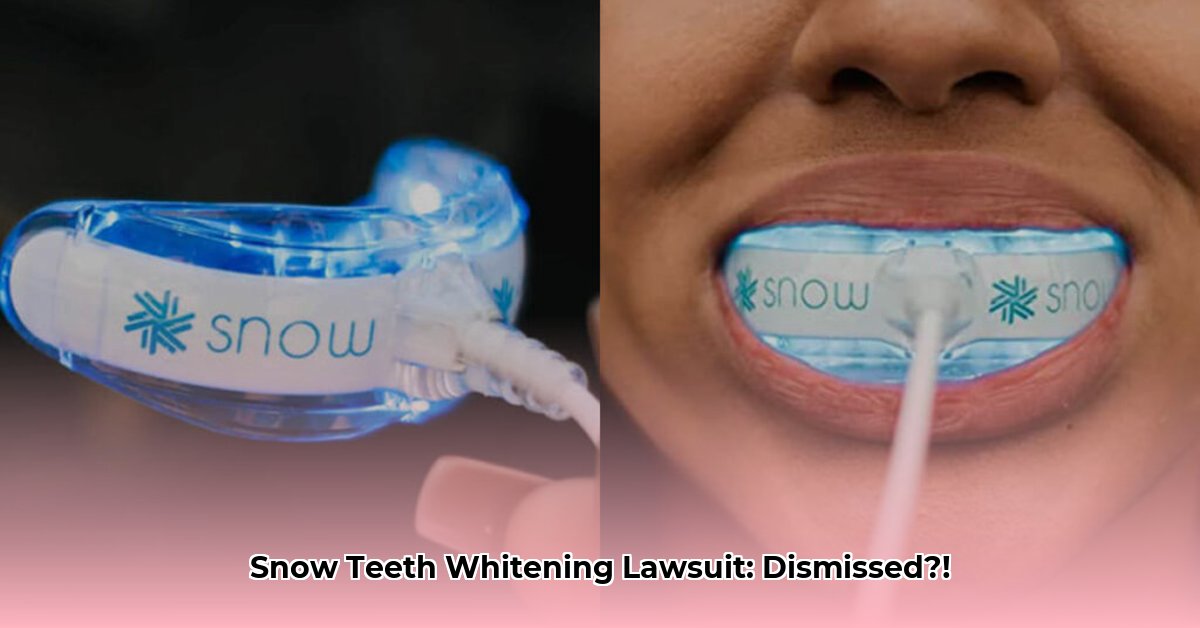The Snow Teeth Whitening company, known for its celebrity endorsements and bold promises, has faced legal scrutiny. This article delves into the lawsuits, focusing on why the Kraus v. Snow lawsuit was dismissed and what it signifies for consumers. We’ll also touch on the less clear-cut Poyer v. Snow case.
The Kraus Case: Dismissed Due to Lack of Standing
The Kraus v. Snow Teeth Whitening LLC lawsuit, filed in the Eastern District of New York (20-cv-6085 (JMA) (ST)), was dismissed on October 9, 2022. The plaintiffs alleged deceptive marketing practices, questioning the product’s effectiveness and claims of COVID-19 protection, FDA approval, patented technology, and awards. However, the dismissal wasn’t about the veracity of these claims. Instead, it stemmed from the plaintiff’s “lack of standing,” meaning they couldn’t demonstrate personal harm directly caused by Snow’s marketing. Specifically, Mr. Kraus purchased the product after initiating the lawsuit, negating any claim of being misled by the advertising. A potential conflict of interest due to a pre-existing relationship between Mr. Kraus and an attorney involved also cast a shadow over the case. This dismissal suggests the judge found the plaintiff’s argument unconvincing, preventing the case from proceeding.
The Poyer Puzzle: An Unclear Outcome
The Poyer v. Snow Teeth Whitening LLC lawsuit (2:22-CV-01506 (JMA) (ST)), also filed in the Eastern District of New York, presents a more complex scenario. While some claims were dismissed on June 5, 2023, the overall status remains unclear. Further investigation is needed to determine the remaining claims and the potential for future developments.
What Were the Allegations?
The Kraus lawsuit targeted several of Snow’s marketing claims:
- Whitening Speed: Plaintiffs challenged the advertised “noticeably whiter teeth in three days,” citing independent lab tests that allegedly contradicted this claim.
- COVID-19 Protection: Snow allegedly suggested its whitening lights offered some protection against the virus—a claim raising concerns about exploiting public anxieties.
- “Proprietary” Serum: The lawsuit argued that Snow’s serum was likely a standard peroxide solution, not a unique formulation as advertised.
- Pricing: Plaintiffs contended that Snow’s pricing was inflated for a product they considered comparable to less expensive alternatives.
Decoding the Dismissal and Its Implications
The Kraus dismissal underscores a crucial legal point: allegations alone are not enough. Concrete evidence of direct harm is necessary to sustain a lawsuit. This outcome may influence future consumer class-action lawsuits against companies like Snow, emphasizing the need for robust evidence before filing. The Poyer case’s uncertainty further complicates the legal landscape. Its eventual resolution could either reinforce the Kraus precedent or carve a new path.
Consumer Guidance in the Teeth Whitening Market
While the Kraus dismissal doesn’t validate Snow’s marketing claims, it also doesn’t definitively prove wrongdoing. It serves as a reminder for consumers to approach marketing with healthy skepticism and conduct thorough research. Consult various sources, compare products, and look for evidence-based information before making purchasing decisions.
Comparing Teeth Whitening Methods:
| Method | Advantages | Disadvantages |
|---|---|---|
| Professional Whitening | Most dramatic results, supervised by a dentist. | Most expensive, may require multiple office visits. |
| At-Home Whitening Strips | Convenient, relatively inexpensive. | Can cause sensitivity, less dramatic and long-lasting results than professional. |
| Whitening Toothpastes | Easy integration into oral hygiene routine, affordable. | Minimal whitening, mainly removes surface stains. |
| Natural Remedies | Inexpensive, accessible. | Can be abrasive to enamel, limited scientific evidence of efficacy and safety. |
The Bigger Picture: Celebrity Endorsements and Consumer Protection
The Snow lawsuits raise important questions. How accountable are celebrities for endorsed products? What’s the influence of social media on consumer behavior? Do potentially misleading claims unduly shape purchasing decisions? These questions warrant attention, perhaps suggesting a need for increased industry regulation and corporate transparency. Consumers must be equipped with the knowledge and tools for informed decision-making. These lawsuits, while inconclusive regarding the truthfulness of Snow’s advertising, highlight the complexity of navigating the marketplace and the importance of cautious scrutiny.
- Small Bento Box Makes Packing Lunch Easy and Fun Again - December 26, 2025
- Adult Bento Box Lunch Ideas For Quick Healthy Portable Options - December 25, 2025
- Adult Bento Meal Ideas for Delicious, Easy, and Healthy Lunches - December 24, 2025










